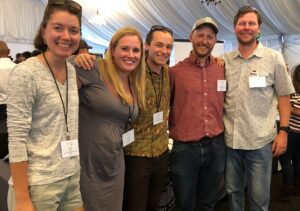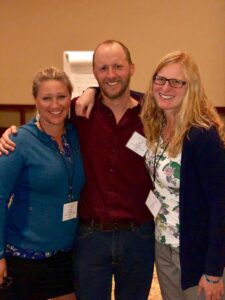 At this year’s Wilderness Therapy Symposium in Park City Utah, True North therapist Bo Bicknell MSW joined clinicians Emily Thelan (Chrysalis School) and Kendra Meiklejohn (Outback Therapeutic Expeditions) to lead a workshop presentation on treating adolescent girls who exhibit self-harming behaviors in the wilderness. Their audience included visiting consultants, wilderness guides, clinical directors, and other wilderness clinicians interested in broadening their perspective and tool set for creating rapport and therapeutic connection with a population of clients that can be complex and intimidating.
At this year’s Wilderness Therapy Symposium in Park City Utah, True North therapist Bo Bicknell MSW joined clinicians Emily Thelan (Chrysalis School) and Kendra Meiklejohn (Outback Therapeutic Expeditions) to lead a workshop presentation on treating adolescent girls who exhibit self-harming behaviors in the wilderness. Their audience included visiting consultants, wilderness guides, clinical directors, and other wilderness clinicians interested in broadening their perspective and tool set for creating rapport and therapeutic connection with a population of clients that can be complex and intimidating.
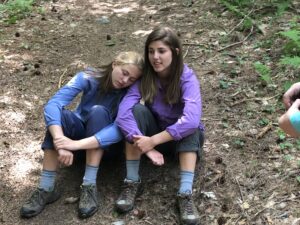
Today, teenage girls find themselves immersed in a culture of shame. Despite powerful movements in the political and social realms, girls still remain surrounded by constant messaging focusing on the superficial and feeding on their self-doubt. Fear of vulnerability and relational struggles lead many young women to worry their friends and terrify their parents by seeking out coping mechanisms that only go ‘skin deep.’ In this interactive workshop, these experienced wilderness therapists explored the root causes and strategies for exhausting self-harming behaviors using the rugged, powerful container that is unique to the wilderness therapy milieu. Participants were engaged with strategies on how to support adolescent girls and their families in finding new perspectives, techniques, and distress tolerance skills that are located in the unique environment of the natural world, in front country and backcountry, and in first intervention and continued care settings. Through the lens of multiple clinical modalities, Bo, Emily and Kendra provided resources and facilitated discussion regarding effectively setting boundaries, maintaining alignment, and empowering young women to take a lead role in their own treatment.
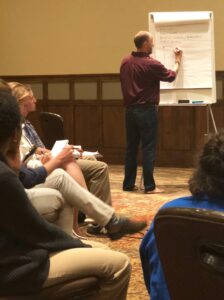 As helping professionals connected to the wilderness therapy community, we all know the benefits the wilderness imparts on the soul, but how can we leverage this container and its magical metaphor with self-harming behaviors? In this dynamic and interactive presentation, these therapists used didactic exposition, visual representations, facilitated discussions, and experiential insight-oriented exercises to engage the participants in a collaborative exploration of techniques for working with struggling adolescent girls. They provided tools for helping professionals to shift the focus from shame and impulsive coping mechanisms to mindful self-awareness and effective strategies for self-care. They also presented techniques for engaging parents in building their own emotional awareness so that they can focus on providing support without being susceptible to the frustration and grief that can accompany their child’s self-harming behavior.
As helping professionals connected to the wilderness therapy community, we all know the benefits the wilderness imparts on the soul, but how can we leverage this container and its magical metaphor with self-harming behaviors? In this dynamic and interactive presentation, these therapists used didactic exposition, visual representations, facilitated discussions, and experiential insight-oriented exercises to engage the participants in a collaborative exploration of techniques for working with struggling adolescent girls. They provided tools for helping professionals to shift the focus from shame and impulsive coping mechanisms to mindful self-awareness and effective strategies for self-care. They also presented techniques for engaging parents in building their own emotional awareness so that they can focus on providing support without being susceptible to the frustration and grief that can accompany their child’s self-harming behavior.
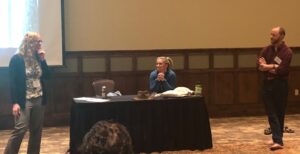 While some might find this topic to be intimidating, a strong crowd of attendees offered their own strategies and perspectives in working with self-harming adolescent girls. While basic safety procedures were briefly discussed, the intention of the workshop was to explore beyond protocols of supervision and risk management. It provided an opportunity to share ideas regarding what happens next: methods for building insight and self-awareness, ceremonies and wilderness rituals aimed at facilitating those magical “ah-ha” moments where a student realizes it’s time to try something new. And, as it goes with so many troubling behaviors and emotional problems that exist in the world, the most universal element to treatment that was discussed turned out to be healthy relationships. When an adolescent has a sense of secure connection and attachment to others, in an authentic way, he or she tends to believe that they have self-worth, and a foundation is initiated upon which they can build a workshop full of tools to use when things get difficult, rather than resorting to old patterns of shame, anxiety, numbing, and self-harm. While the statistics remain staggering (roughly 1 in 4 adolescent girls have intentionally harmed themselves as a coping mechanism), light is being shown on the subject and treatments are continuing to emerge. We at True North, as well as the brilliant and talented co-facilitators from Chrysalis and Outback, are excited to continue taking part in helping these young people find new methods for developing a sense of control over their lives.
While some might find this topic to be intimidating, a strong crowd of attendees offered their own strategies and perspectives in working with self-harming adolescent girls. While basic safety procedures were briefly discussed, the intention of the workshop was to explore beyond protocols of supervision and risk management. It provided an opportunity to share ideas regarding what happens next: methods for building insight and self-awareness, ceremonies and wilderness rituals aimed at facilitating those magical “ah-ha” moments where a student realizes it’s time to try something new. And, as it goes with so many troubling behaviors and emotional problems that exist in the world, the most universal element to treatment that was discussed turned out to be healthy relationships. When an adolescent has a sense of secure connection and attachment to others, in an authentic way, he or she tends to believe that they have self-worth, and a foundation is initiated upon which they can build a workshop full of tools to use when things get difficult, rather than resorting to old patterns of shame, anxiety, numbing, and self-harm. While the statistics remain staggering (roughly 1 in 4 adolescent girls have intentionally harmed themselves as a coping mechanism), light is being shown on the subject and treatments are continuing to emerge. We at True North, as well as the brilliant and talented co-facilitators from Chrysalis and Outback, are excited to continue taking part in helping these young people find new methods for developing a sense of control over their lives.
